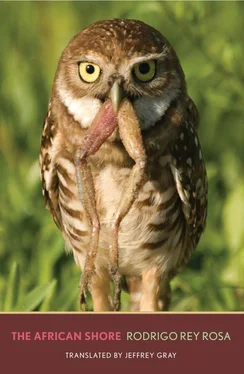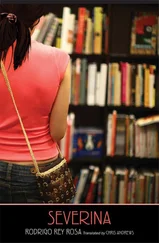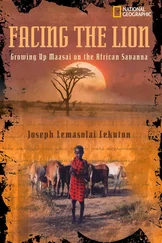“Yes, just a moment,” he answered.
“I’ll wait outside.”
The woman smiled.
“Where are you going?”
“To Tangier.”
“Is he your friend?”
“Not really. He’s sort of a guide.”
“We’re going to Tangier too. We could give you a ride.” She hesitated. “You don’t mind that I speak to you as tu ?”
“No, of course not. Thank you.”
“If you like, I’ll hold the bird, no?”
He gave her the cage.
“Sure,” he said.
He came out of the clinic into the late afternoon light. Rashid and the taxi driver sat in the Mercedes. He leaned his head toward the window and said to Rashid:
“These ladies are going to take me.”
“All right. But pay the driver.”
He took his last fifty dirhams out of his wallet and gave them to Rashid.
“That’s not enough.”
“Rashid, I don’t have any more.” He opened his wallet to show him.
“The price is one hundred,” said the driver to Rashid, “and that’s because it’s you.”
“I’ll pay you later, Rashid.”
“Give me a guarantee,” Rashid said, irritated.
“All right.” He took off his wristwatch and handed it to him.
Rashid smiled.
“That’s good.” He turned to the driver. “Let’s go. I’ll pay you in the Medina,” he said in Arabic.
The wheels of the Mercedes shot out gravel and raised two little clouds of dust. The doctor’s dog did not stop barking until the car had swung onto the asphalt road to silhouette itself against the sky and the sea. Then it crawled back into its barrel.
Inside the clinic, the little Pekingese had come to. It stood up on the table, wagging its tail. It barked twice hoarsely, gave a little jump, breathed hard, and shook its head.
“What an actor,” said Mme. Choiseul. “He just wanted us to take him for a ride in the car.” She turned to her friend. “Right, Julie? I assure you, doctor, he’s faking these fainting spells.”
“I don’t think so,” said the doctor. “But only Allah knows all.”
The woman picked the dog up and put it on the floor, where it barked and ran circles around her.
“All right, Taubin, shut up.” She opened her purse to take out a hundred-dirham note, which she gave to the doctor.
“Thank you,” he said. “Until next time.”
“Ah, what heavenly light,” said Mme. Choiseul as she stepped into the evening breeze. The Pekingese ran over to urinate against a row of sand-colored rocks that bordered the doctor’s garden, then turned to inspect the strange camel prints in the middle of the road. The doctor’s dog silently crept out of its barrel and hurled itself at the Pekingese, which saw it only at the last instant. It jerked its body sideways and yelped.
“Oh, the poor bird,” exclaimed Mme. Choiseul, looking at the owl. “It should be free.”
The sun hadn’t set, but the heat of the day was gone.
“Let’s go,” said the younger woman. “I’m cold. Maybe the gentleman can explain to us on the way what he’s doing with an owl.”
They got into the car. The little dog, showing no interest in the owl, barked at some children selling pine nuts by the roadside. The eucalypti and mimosas parted on either side of the car, their odor pouring in through the windows.
“I’m here by accident,” he began to explain.
After giving a somewhat glamorized version of his story, he learned that Julie Bachelier was a student of archaeology, interested in the Roman and pre-Roman history of the area. She was on vacation, staying at Mme. Choiseul’s house on the outskirts of Tangier. Mme. Choiseul’s first name was Christine. She was an exceptionally bad driver.
For a moment, he imagined the two women embracing each other.
“My mother is an accountant,” said Julie. “She works for Christine in Paris.”
He decided he was interested in Julie.
“You have a Moroccan face,” Mme. Choiseul told him.
“So I’ve been told,” he replied. “I don’t think I’d like to be Moroccan.”
“Do you like being Colombian?”
“To tell the truth, not much. No.”
The Frenchwomen agreed: it would be better to have been born European.
“But in Europe I feel suffocated. Too much organization,” he said.
From the heights of R’milat one could see the city of Tangier lying in the hills, like a wide salt marsh in the evening light. Passing the giant palaces of the Saudi princes, Mme. Choiseul turned on a narrow road that descended between two high stucco walls, now in disrepair and heaped with bougainvillea and honeysuckle in flower.
“Oh, what am I doing?” she shouted. “Where was it you were going? My mind was wandering — I was going to our house.”
“To the Medina.”
“The Medina? What are you going to do there?”
“I’m staying there, in a pension.”
“Really?” said Julie.
“I haven’t found anywhere else that will take me in with the bird. It’s really a bit depressing.”
“Well, then,” said Julie, “you can’t be in much of a hurry to go home. Why don’t we invite him for coffee with us, Christine?”
“Mais oui,” said Mme. Choiseul. Looking in the rearview mirror to see what he would say, she nearly scraped the right side of the car against a wall. “Oh là là!” she cried.
Mme. Choiseul’s house, in the upper reaches of the Sidi Mesmudi road, stood on a small plateau surrounded by a large olive garden, a high curtain of eucalypti, and a canebrake.
“Artifo!” she shouted, getting out of the car and letting loose the Pekingese, which ran toward the lower part of the yard.
The garden, descending in small terraces, had a fountain, many narrow flower beds, and, farther down, a black monkey tree that rose up against the sky.
Artifo, an old man with a close-cropped beard and a fisherman’s cap, appeared in a side door.
“Yes, Madame?”
“Tell Fátima we’re going to have tea. And light the fire in the living room and in my room. It has to be done every day,” she explained, turning her back on Artifo.
They came out of the garage. From where they stood the sound of waves could be heard under the murmur of the wind in the branches. But the shore had to be far off, he thought.
They passed through a dark hall into a living room decorated with many potted plants and flowers where the dwindling light came through several small arched windows. The walls were upholstered in red, pink, and violet satin bands, and the floor was spongy, thick with Berber rugs covered with designs suggesting hands and eyes. The little coffee tables were stacked with art books, and the bookshelves were also heavy with old volumes. Julie took the birdcage from his hands and put it on a sideboard between two windows.
As they sat down next to the fireplace, Mme. Choiseul on a small sofa, with the Pekingese on her lap, Julie on a Moroccan pouf, her arms around her knees, and he on a low couch, Artifo covered a heap of dry eucalyptus leaves with sticks of firewood and lit them.
The colors of the room brightened with the first flames and a medicinal smell enveloped them.
“I know it’s not so cold as to need a fire,” said Mme. Choiseul, whose cheeks were turning red in the firelight, “but it’s not too hot to light one either. I worship fire.” She looked at the fireplace. “I get cold easily.”
Artifo left the room.
Now Mme. Choiseul looked at the owl.
“It’s lovely,” she said, and turned toward him. “The Moroccans have a whole repertory of animal stories, did you know? There’s one about an owl.”
An old woman, slightly stooped, with a white kerchief tied around her head, appeared at the door from the kitchen, carrying a large tea service.
Читать дальше












